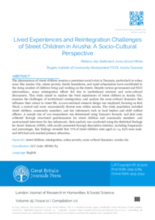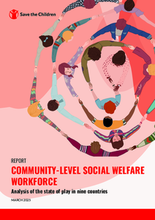Displaying 1 - 10 of 104
This article reports how the Tanzanian government has committed to strengthening alternative care services and the management of children’s homes nationwide to ensure they meet required standards and better support child welfare and protection.
On October 23, 2025, the Transforming Children’s Care Collaborative hosted a webinar exploring Kafaalah—a long-standing childcare practice in Muslim communities that has been observed for more than 1,400 years.
This study examines the experiences of street children in Arusha City, Tanzania, highlighting the challenges they face due to poverty, family breakdown, and rapid urbanization. Findings show that most street children are boys aged 10–14 with only primary education, and reintegration efforts often fail because of institutional mistrust and socio-cultural barriers.
This article describes how the government of Tanzania has launched a national initiative aimed at supporting children who live and work on the streets, with initial roll‑out in Dar es Salaam, Dodoma and Mwanza focusing on education, vocational tra
This news article, from the Guardian Tanzania, notes how the government of Tanzania has initiated a nationwide programme to support children living and working on the streets, marking a significant step towards protecting vulnerable groups and fostering inclusive development.
Interviews with care leavers and instructors in Zimbabwe found that institutional life skills programs strengthen resilience, self-reliance, and adaptability, helping youth navigate challenges after leaving care. However, outdated curricula, limited follow-up support, and restricted financial access constrain agency and economic participation, highlighting the need for more relevant training and structured transitional support.
This report, based on a study across nine countries, examines how to strengthen the community-level social welfare workforce (CLSWW) as a vital but under-resourced part of national child protection systems. It calls for context-specific strategies that clearly define roles and competencies, build capacity, and align with local norms, mechanisms, and resources to enhance child protection outcomes.
In this webinar, the Independent Expert on the Enjoyment of Human Rights by Persons with Albinism, Muluka-Anne Miti-Drummond, shared findings from her recent report on children with albinism and the right to family life. Staff from UNICEF and NGOs in Madagascar, Tanzania, Malawi and Uganda also shared lessons learned.
The UNICEF/ CTWWC Regional learning platform on care reform in Eastern and Southern Africa will be holding a webinar on care reform for children with albinism. What do efforts to care for children with albinism tell us about disability inclusive care reform? Efforts to prevent family separation and support family-based alternative care for this highly vulnerable group of children have led to many lessons learnt on care reform in Africa.
Date: Tuesday 10 October 2023
Time: 10:00 (UTC/GMT +02:00 - Europe / Brussels)


